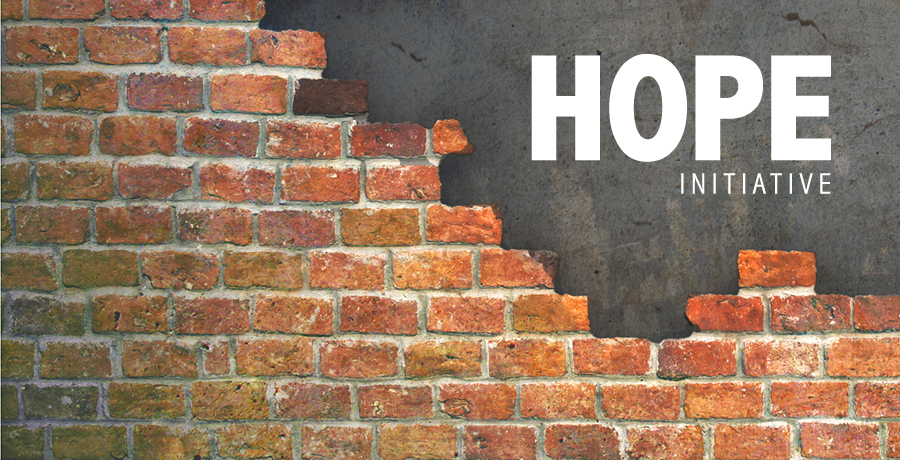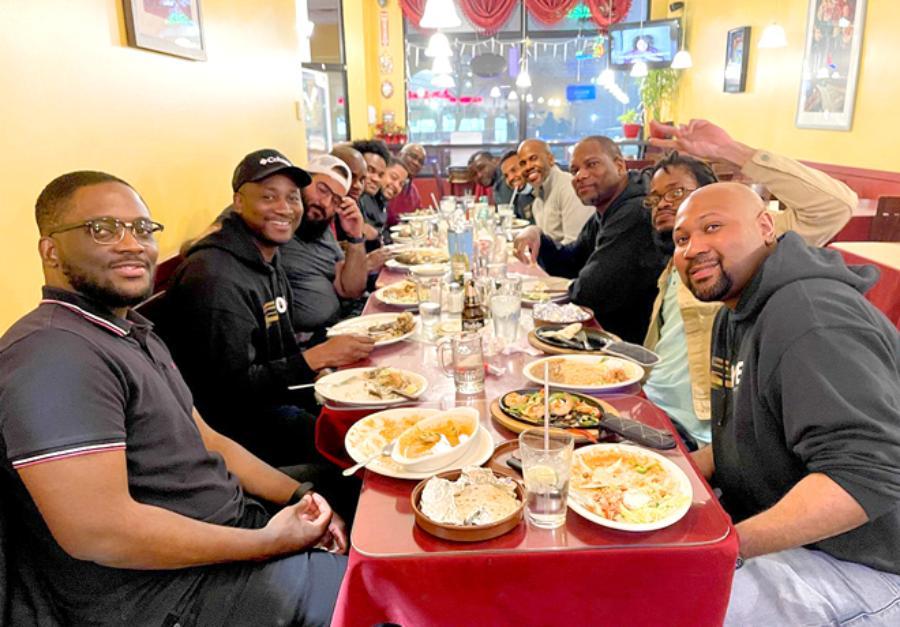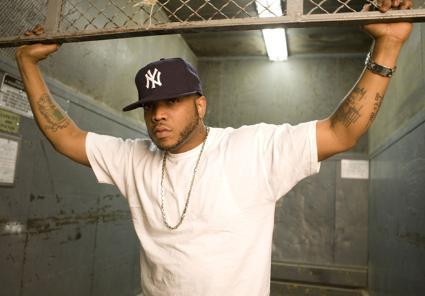
Breaking Barriers
HOPE Initiative empowers Black males and Latinos at BHCC.
"So much about being in college is about mattering. We look for opportunities to make students feel connected to the College, and to create that sense of belonging so that the students feel they are part of something.” –Evans Erilus
BREAKING BARRIERS
The Halting Oppressive Pathways through Education (HOPE) Initiative at BHCC was launched in 2017 with the goal of examining and eliminating the social, institutional, and academic barriers that prevent males of color from reaching their full potential. The project was started by a group of BHCC faculty, staff, and administrators who were concerned about the empowerment of males of color on campus.
Conversations from that group carried into the inaugural Center for Equity and Cultural Wealth Institute that spring and into a series of Think Days that included representatives from across the College community. HOPE has been under the leadership of Interim Director Evans Erilus since Summer 2021 and it has grown into a well-resourced program with 11 full-time staff members, part-time staff member positions, and student leaders.
"By involving students and staff members from across the College, the HOPE Initiative is a model for breaking down institutional silos.” –Evans Erilus
The services provided by the HOPE Initiative are grounded in the philosophy of putting student voices and experiences at the forefront. HOPE is an asset-based, student-centered program that concentrates on the gifts of Black and Latino males and the ways in which society and higher education must shift to better recognize these gifts.
The dedicated faculty, staff, and student ambassadors that run the HOPE Initiative provide resources and networks for students to navigate college both on and off campus, taking a multilayered approach that includes multiple touchpoints with students by both peer mentors and professional staff.
"It’s a real labor of love,” says Erilus, who was brought into the discussion on Black and Brown men through the HOPE Think Day series by HOPE Co-Leads Carlos Maynard and Nuri Chandler-Smith, and has been with HOPE every step of the way. “So much about being in college is about mattering. We look for opportunities to make students feel connected to the College, and to create that sense of belonging so that the students feel they are part of something.”
As part of the project in spring 2020, HOPE received a Data4Impact (D4I) grant for the collection and analysis of qualitative and quantitative data to identify and address inequitable systems and structures at the College so Black men and Latinos can thrive. This funding allowed for the pilot of the HOPE Ambassadors program, a student-driven effort to gather and analyze qualitative data, as well as to provide peer mentorship, resiliency guidance, problem-solving support, general (non-academic) assistance, and “safe space conversations” for Black and Latino males at BHCC.
In 2021, the HOPE Initiative partnered with the Boston Private Industry Council (PIC) to launch HOPE Forward, a collaboration between the Opportunity Youth Collaborative and the HOPE Initiative. BHCC has worked with the PIC for over a decade to provide coaching for Boston Public School graduates as part of the Success Boston college completion initiative. Success coaches at BHCC help students succeed academically, balancing their education and work life, and imagining their career paths beyond college.
The HOPE Forward program builds on the Success Boston framework, focusing on outreach and coaching for young men of color, students who have stopped out of college, students starting college late, and students transferring from other colleges.
Working with the Opportunity Youth Collaborative and PIC Youth Transitions Director, Kathy Hamilton, Erilus has used student input to develop high-touch strategies to scale up pathways for success and increase college completion taking the student perspective on issues that directly affect their lives.
HOPE Ambassadors are student leaders and recent BHCC alumni who form connections with students, execute first-level advising, and provide resources and directions that eliminate barriers as students navigate their college experience. Ambassadors receive training at the beginning of each semester on these outreach strategies and training on critical resources throughout the term. In the process, they become well versed in navigating BHCC resources, and serve as peer mentors for students, gathering student voices through surveys and focus groups, and bringing their voices to data committee meetings and partner convenings.
Series of Engaging Events
.jpg)
The HOPE Initiative leans on the knowledge and experience of not only its staff, but also the BHCC community in forming connections with Black and Latino male students.
This past fall, the HOPE Initiative created a series of events focused on engaging students throughout their experience at BHCC. These included a Welcome Month series to provide students the opportunity to engage with HOPE staff and peers through open office hours, workshops, dialogue series discussions and dinners. The activities offered an overarching welcome to the start of a new semester and celebrated participants as individuals. The HOPE Initiative provided a host of other programs over the fall and spring semesters including a Student Dialogues series that provided affinity-based spaces for Black and Latino males to share their experiences and for staff to gather qualitative data.
For Erilus, the biggest takeaway from these focus groups is that students need to know, not just feel, that they matter. “They need to see an accurate reflection of themselves in their experiences and feel included,” he says. “This is what leads to persistence and retention. It’s about being a part of something, and in a lot of ways in higher education, we need to break down those institutional inequities and barriers.”
By engaging students in their experience, the HOPE Initiative is establishing a data-driven and student-centered foundation for responsive (vs. reactive) programming and services. This data collection and programmatic response model has been integrated throughout HOPE.
Additionally, the HOPE Initiative has created faculty-led study group sessions in gateway courses, such as accounting, English, and math, that are designed to promote this affinity-based collaborative learning model. Participants are offered incentives for consistent attendance and engagement.
HOPE also welcomes students to monthly dinner gatherings known as #BREAKINGBREAD dinner events. These are held at culturally relevant restaurants in students’ communities and create an opportunity for HOPE Success Scholars and staff to gather outside of the college campus.
Professional Development Key
HOPE acknowledges the importance of professional development that enables faculty, staff, and administrators at the College to be active contributors to the elimination of systemic barriers to student success.
CHANGING THE NARRATIVE
 HOPE Ambassadors build community for males of color at BHCC
HOPE Ambassadors build community for males of color at BHCC
Business Administration major David Timothy enjoys having the opportunity to help students directly. “It’s a really beautiful initiative and idea,” he says. As a HOPE Ambassador, Timothy forms connections with students on campus and makes sure they know about the resources available to them to make them successful. “I am able to help people in a different way than I have before—especially because I am able to affect change and have a voice in how Black and Latino males are seen at school and how they are informed.”
Timothy transferred to BHCC from Berklee College of Music right at the inception of HOPE’s work with the Boston
Private Industry Council. While the support he found at BHCC afforded him the opportunity to work on himself and his artistry—his first album is due to be released later this year—it’s his experience as an Ambassador that allowed him to witness HOPE’s impact on retention and graduation rates among his peers. “It’s an opportunity that allows me to change the narrative, and to perpetuate a community that ensures the success of its members.”
Last fall, Timothy along with his fellow Ambassadors, represented HOPE at a youth forum leading up to the Boston mayoral election. The group brought the lens of how the election would affect community college students, particularly Black and Latino males who had stopped going to school or engaging in their society.
“Our main focus was youth voices,” he says. “We focused on the statistical data available. We wanted to get a clear sense of each candidate’s plan to make sure that city youth were strengthened and set up for success, and how they would encourage students to come back to school.”
Timothy believes that more schools should adopt a similar philosophy for their students on an institutional level. He looks forward to seeing the HOPE Initiative continue to grow and expand to other communities on campus.
David Timothy
Over the past several years, HOPE has offered faculty and staff the Black Minds Matter course and an Open Yale African American History course that provides theoretical frameworks, research, and best practices on issues facing boys and men of color in education.
And, in the fall of 2021, HOPE rolled out a new paid, semester long fellowship opportunity for faculty and staff to engage in professional development with project-based deliverables facilitated by HOPE Co-Lead Carlos Maynard. HOPE Fellows identified, researched, and developed projects that aligned to their courses or work areas to support HOPE Initiative student outcomes.
“By involving students and staff members from across the College, the HOPE Initiative is a model for breaking down institutional silos,” says Erilus, stressing the importance of cross-training staff members at the College so they are better prepared to serve students. “This model allows for students at the College to have access to staff from the International Center, Veterans Center, Admissions, Dual Enrollment and Early College, and Single Stop.”
The HOPE Initiative serves as a gateway to understanding BHCC students and their experiences, and using this understanding to provide collective and individualized resources for Black and Latino males that helps them feel part of the College community and empowers them to excel at BHCC and beyond.
While the HOPE Initiative launched as an initiative to remove barriers keeping males of color from attaining their goal of completing college, Erilus hopes to expand the program to empower women and other students of color at BHCC.

Breaking Bread dinner event series supports and connects HOPE Scholars and Black and brown businesses in Boston.
HEALTH IS WEALTH

The HOPE Initiative welcomed rapper, speaker and entrepreneur Styles P to its first Virtual Student Summit in April. The “Health is Wealth” event focused on healthy choices, exercise, mental wellness, and career pathways.
Styles P, a member of The LOX, is the co-owner of Juices for Life with Jadakiss, who he grew up rapping alongside. The pair is committed to bringing health access to low-income communities through access to healthy food and information. They have opened a chain of juice bars in New York City’s food deserts.
“Health is the key ingredient to whatever you’re trying to achieve in life,” said Styles P, stressing the importance of both physical and mental health in a panel discussion moderated by HOPE Ambassadors. “It’s not a separate conversation. You take care of yourself first to the best of your ability, then your family and community. If you all take the time to do this, we’ll make the world a better place.”
Featured Keynote Speaker Styles P, American rapper and speaker

